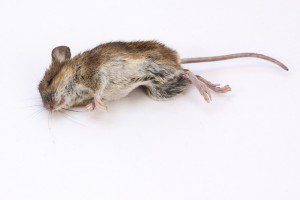That Dead Mouse Really Smells!
By Chris Williams on March 30, 2016.
I think we must have a dead mouse somewhere in our walls. There’s a really bad smell in our upstairs hallway. If it’s a mouse, how long is this smell going to last? B.B., Pinardville, NH

Dead Mouse
There are many variables that contribute to the amount of odor from a decaying animal: the size of the animal (or how many), the temperature and humidity, ventilation, location of the carcass (how close it is to living areas), and the tolerance of the individual. The smell could be a problem for only a day or two, or it could last for weeks.
A carcass will smell until it is consumed by insects or until it is dried out and mummified. Decay odors are more noticeable in warm weather than in cold weather, and worse in humid areas than in dry spaces. The positive side of this is that carcasses decay more quickly in warm weather so the odor will disappear sooner. A dead animal in a really damp place could smell for weeks. The odor from a single mouse may be hardly noticeable given the right conditions, while the odor from the carcass of a larger animal such as a squirrel may be unbearable for a long time (see Smells Like Something Died!).
Look Out for Insects From That Carcass
As the odor is disappearing, you may start noticing a new problem from insects that infest carcasses, such as blow flies or dermestid beetles.
Blow flies and flesh flies are amazing in their ability to detect a dead animal, even from great distances, and then find their way inside. Once eggs are laid on the carcass, fly larvae will quickly hatch and feed on the rotting tissue. Dermestid beetles (hide beetles, carpet beetles) may follow the flies, feeding on sinew, hair, whatever’s left. After they finish with the carcass, dermestids can infest foods or other items in your home that are made of plant or animal materials. And, flies emerging from a hidden carcass can become a nuisance elsewhere in your house.
Can You Get Rid of the Odor?
If you know, or think you know, where the carcass is located, have it removed ASAP and the area treated for any insects present. Then ventilate or deodorize the site. If you can’t access the carcass but know its location, you can sometimes drill a hole into the void and inject a deodorizing or odor neutralizing product.
The amount of effort and expense you put into trying to eliminate the odor will depend on the size of the carcass and your tolerance level. The odor from a mouse or two may not call for special measures. For more serious odors, room air cleaning devices with special filters are sometimes used if odor control products don’t do the job. You might choose to just wait it out; that smell will disappear eventually.
Don’t forget to deal with the source of your odor problem – mice. If you have a mouse infestation and you’re using poison bait, this scenario could happen again as mice die in hidden places. Give Colonial Pest a call and let us set up a mouse control program for you that will mean no more dead mouse odors.